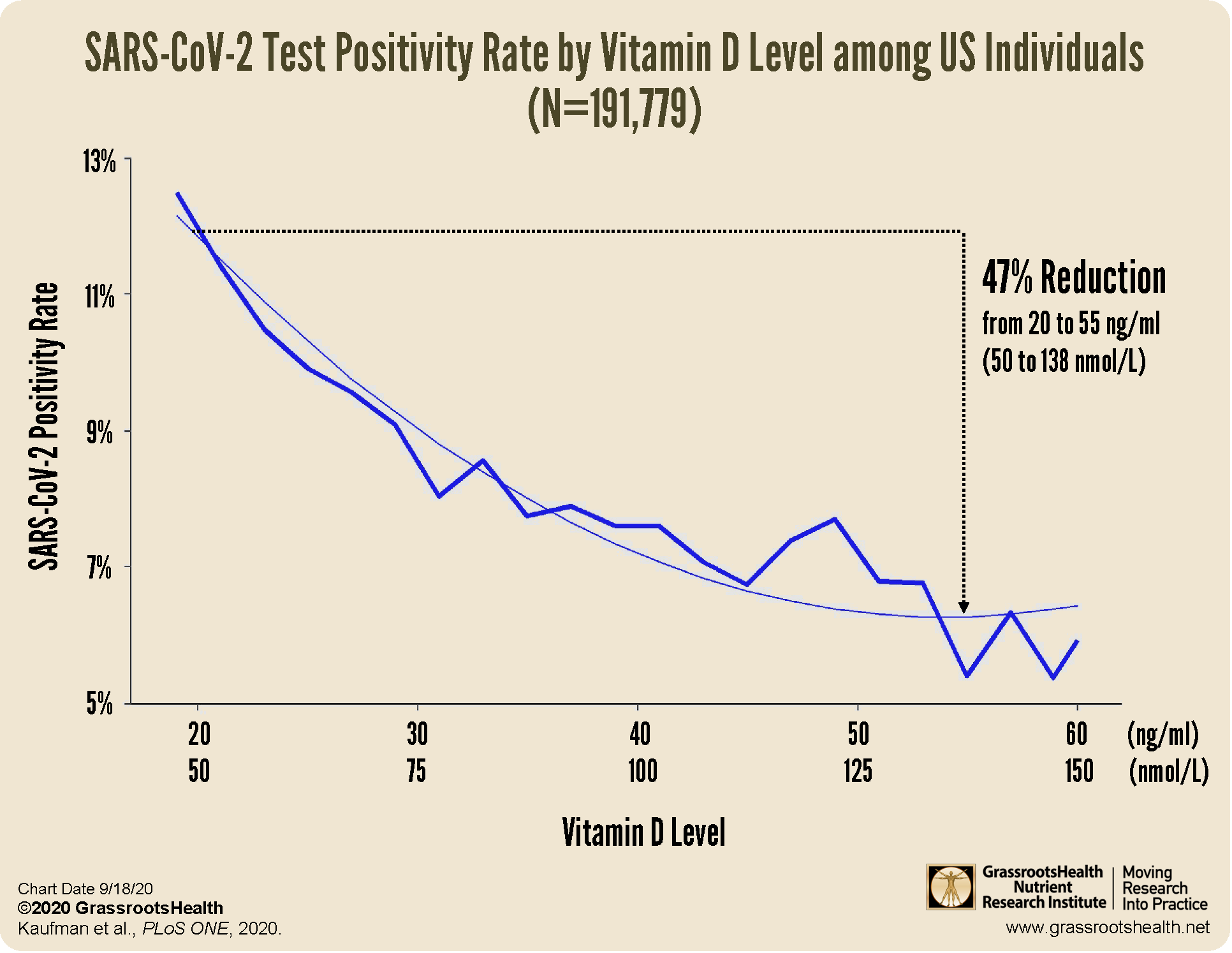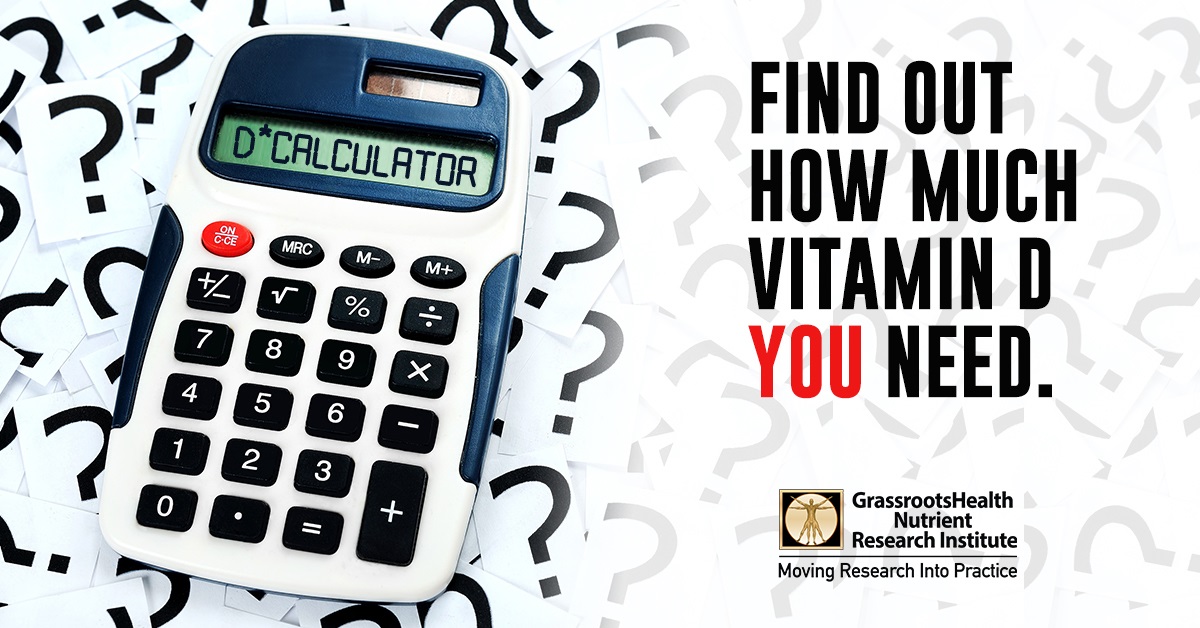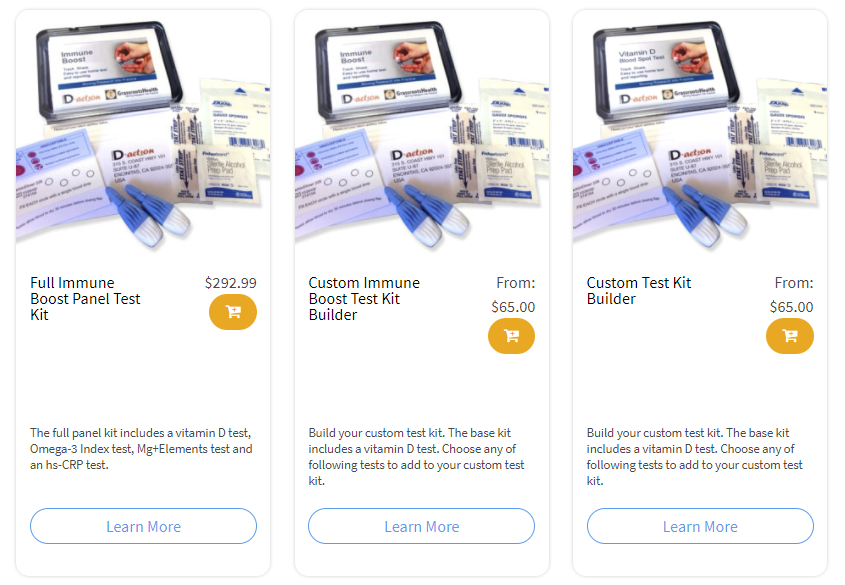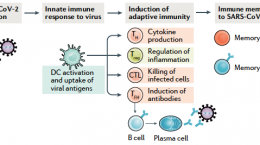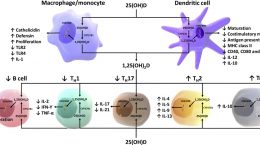Published on September 21, 2020
An analysis of over 190,000 US SARS-CoV-2 test results shows positivity rate halved with vitamin D levels of 55 ng/ml or higher vs. less than 20 ng/ml
 Evidence for vitamin D and its importance in fighting COVID-19 continues to mount, with one of the latest studies recently published by Kaufman et al. showing the positivity rate of SARS-CoV-2 (the virus associated with COVID-19) being strongly associated with vitamin D levels.
Evidence for vitamin D and its importance in fighting COVID-19 continues to mount, with one of the latest studies recently published by Kaufman et al. showing the positivity rate of SARS-CoV-2 (the virus associated with COVID-19) being strongly associated with vitamin D levels.
Vitamin D has many functions within the immune system which supports its direct involvement in the immune response to the SARS-CoV-2 virus and combating COVID-19. Many observational studies have been published showing a strong relationship between vitamin D level and COVID-19 disease severity and outcome, including the Radujkovic study showing a 15 fold higher risk of death for those with vitamin D levels below 12 ng/ml (30 nmol/L) versus 12 ng/ml or higher. Also, the first published randomized controlled trial on vitamin D and COVID-19 showed that vitamin D given to COVID-19 patients upon admission to the hospital [as 25(OH)D], resulted in a reduced need for intensive care, from 50% in the control group to only 2% in the vitamin D group, and the elimination of deaths.
53% Lower SARS-CoV-2 Positivity Rate Among those with Vitamin D Level of at Least 55 ng/ml vs those Below 20 ng/ml
A new paper by Kaufman et al. (including our own Scientists Panel member Dr. Michael F. Holick) looked at vitamin D levels over the past year and COVID-19 test results from March to June of 2020. Data from over 190,000 patients from 50 states who were tested at Quest Diagnostics lab were included. The investigators used zip code data to match with US Census data to perform analyses based on race/ethnicity and latitude.
The researchers found that the percent of positive SARS-CoV-2 tests was 12.5% for those with vitamin D levels less than 20 ng/ml (50 nmol/L) and 5.9% for those with levels at or above 55 ng/ml (138 nmol/L), which is a 53% lower positivity rate with higher vitamin D levels!
The chart below shows the decreasing positivity rate as vitamin D levels increase. Specifically, from 20 ng/ml to 55 ng/ml there was a 47% lower positivity rate.
It is important to note that after adjusting for gender, age, latitude, and predominate race/ethnicity within zip code of residency, the risk reduction remained similar (43% lower risk from 20 ng/ml to 55 ng/ml).
Additional Analysis by Ethnicity
The analysis performed for ethnicity was based on zip code, meaning that ethnicity was presumed based on ethnic predominance within each zip code (where “predominantly” was defined as greater than half the population in that zip code). With this in mind, the generalized break-down of percent lower risk from 20 to 55 ng/ml by ethnicity was:
- For predominately non-Hispanic Black zip codes: 45% lower positivity rate from 20 ng/ml to 55 ng/ml.
- For predominately Hispanic zip codes: 43% lower positivity rate from 20 ng/ml to 55 ng/ml.
- For predominately non-Hispanic White zip codes: 40% lower positivity rate from 20 ng/ml to 55 ng/ml.
How is your vitamin D status?
Could a vitamin D deficiency be putting a damper on your immune response? Do you know your levels of other immune-important nutrients as well? Find out by testing your vitamin D, omega-3s, magnesium and other essential elements (including copper and zinc), as well as your inflammation levels, with the new Immune Boost home test kit offered by GrassrootsHealth. Measuring levels is the only way to know if you are supporting your immune system and whether additional changes should be made, with supplementation, dietary changes, or both.
Enroll now with the Full Immune Boost Panel (which includes tests for vitamin D, Omega-3 Index, magnesium, zinc, selenium, copper, and hsCRP), and get 10% off when you use coupon code BoostTen at checkout.
What Does it Take YOU to Get Your D to 40 ng/ml (100 nmol/L)?
Did you know your health could be greatly affected by making sure you have a vitamin D level of at least 40 ng/ml (100 nmol/L)? Help us help you.
STEP 1 – Do you know what your vitamin D level is? If not, be sure to test today to find out.
STEP 2 – Determine your target level. Are you at your target level? Experts recommend a level of at least 40-60 ng/ml (100-150 nmol/L).
STEP 3 – Need to boost your level? Use the D*calculator to see how much vitamin D it may take to reach your target. Opt for the Loading Dose for a quicker boost.
STEP 4 – Optimize how your body absorbs and utilizes vitamin D with co-nutrients and these simple steps.
STEP 5 – Re-Test! This is an important step to make sure you have reached your target level, and to ensure you are not taking too much! Re-testing after 3-4 months is recommended.
STEP 6 – Adjust, Repeat…
Give your immune system the nutrients it needs to support a healthy you and protect yourself from unnecessary diseases, especially COVID-19.
NEWS ALERT
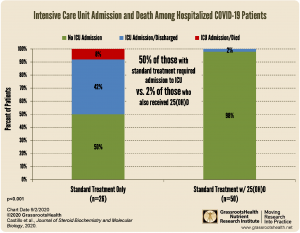 The first Randomized Controlled Trial on vitamin D and COVID-19 has shown a 96% lower risk of ICU admission for those receiving vitamin D (as 25(OH)D to quickly boost vitamin D blood levels) along with the standard treatment, compared to those receiving standard treatment alone.
The first Randomized Controlled Trial on vitamin D and COVID-19 has shown a 96% lower risk of ICU admission for those receiving vitamin D (as 25(OH)D to quickly boost vitamin D blood levels) along with the standard treatment, compared to those receiving standard treatment alone.
These results support many previous observational studies showing a relationship between vitamin D levels and intake and COVID-19 severity.
Review the Latest Nutrient Research for COVID-19
GrassrootsHealth Nutrient Research Institute has launched the new Immune Boost project with the use of our myData-myAnswers nutrient health system that nearly 15,000 people are already using for their health. Specific markers that influence immune health are suggested for testing as part of this project including:
- Vitamin D
- Omega-3 Index
- Essential elements magnesium, selenium, and zinc
- hsCRP
Our goal is to demonstrate how one can use the Nutrient Research Model established by Dr. Robert Heaney to show the effect of vitamin D serum levels of at least 40 ng/ml (100 nmol/L) on risk reduction for all ethnicities in the population. Status and intake of other nutrients will also be analyzed for any type of relationship to immune status and symptom severity. Join the project today!
Please let us know if you’re interested in helping sponsor this project.
CLICK HERE for updates and new information about the project.
Through GrassrootsHealth Nutrient Research Institute, you can also test your essential elements magnesium, copper, zinc and selenium, toxins such as lead, mercury and cadmium, as well as your omega-3 levels, inflammation levels and thyroid stimulating hormone (TSH) level. Find out your levels today! Log on to the test selection page (click the link below) to get your tests and see for yourself if your levels can be improved.
Make sure you track your results before and after, about every 6 months!
Click Here to Access the Test Page
How can I track my nutrient intake and levels over time?
To help you track your supplement use and nutrient levels, GrassrootsHealth has created the Personal Health Nutrient Decision System called
For each specific supplement, you can track what days you take it, how much, and many other details. This will help you know your true supplemental intake and what patterns of use work for you to reach and maintain optimum nutrient levels. Check it out today!


